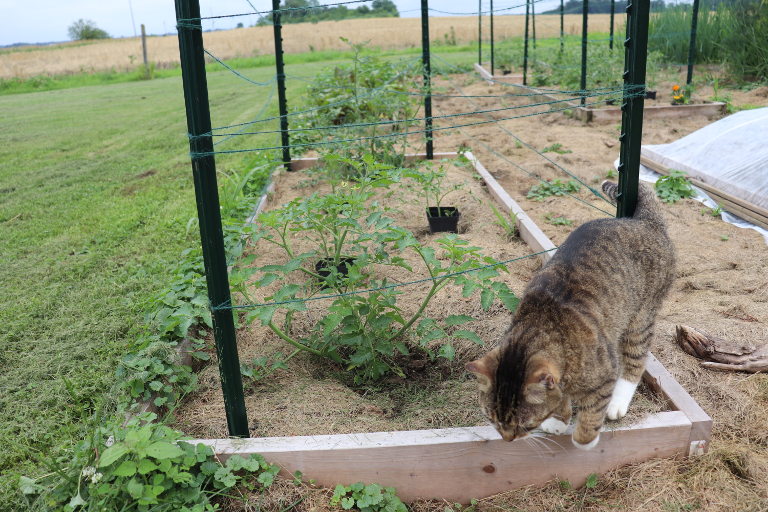Within the last twenty-four hours, rain, freezing rain, sleet, snow, and wind have all battered our area, and several of them are still continuing now. The ground and roads are either slushy or icy; the sky is grey. I think this is a good time to post something I wrote a few years ago in the late spring.
Although I’m sometimes reluctant to go out and work in the garden – I don’t want to get dirty, it’s hot and humid, there’s an overwhelming amount to do – I am always astonishingly happy when I do. I begin by pulling weeds or hoeing with mechanical efficiency; soon I settle into a more meditative rhythm, no less efficient but hypnotic and easy. Like a Shaker or a Sufi spinning into peace, I work my way down the rows and across the raised beds while my mind settles and my body relaxes. The smell and feel of dirt is so delightful that I pause and lay my hands on it and in it, hot from the sun or cool in the early morning. Ants and worms work their way through the brown mountains and valleys around my hands. I sometimes disturb them, but they don’t seem to mind and soon return to their work.
That was not the case with the bumble bees whose nest I forked up last spring. At first the nest looked like a clot of dead leaves and grass, but it emitted an ominous humming. My feline assistant and I bent over the clot; I noticed that it seemed to be held together by some kind of silk. The cat prodded it lightly with his paw, and the humming swelled. A big bumble bee burst out and flew up toward the cat. Five or six others followed, some large, some small, but all intent on defending themselves. The cat and I decided that it was about lunchtime and trotted with desperate dignity back to the house, twitching and flailing as we went, until the bees gave up and returned to the garden. I didn’t finish that bed for several days.

Once the beds and rows are planted, I sit in the dirt and weed. Although I could never tell you in February what parsley, basil, or marigold seedlings look like, I recognize them as soon as they’re up, old friends reminding me of how close we used to be. Sometimes only weeds come up for days and days, and I get worried. What’s happened? Will my seedlings ever arrive? Have I done something to discourage them? When enough rain falls and sun shines and they finally do, I feel disproportionate relief. I confess I talk to them, especially to apologize to them for the cat’s unconventional gardening methods. There usually comes a point when his contribution is not as helpful as he thinks it is. If he’ll sit across my shoulders, he can stay; otherwise, I take him inside and let him relax on the sofa until I’m done.
Every change that I observe as the season advances gets reported at dinner. “There are three flowers on the biggest tomato plant,” or “The gooseberries are just about ripe.” Mealtimes are probably tedious for the non-gardeners because I always report what food is ours. “These are still last year’s potatoes and onions, the herbs are the ones I dried last summer although the chives and sage are fresh, and all the salad greens are from our beds.” It’s a mark of some pride when I’ve grown everything except the meat; even then, I buy it from a local butcher who got it from my neighbors.
Because I garden, our family’s prayer at dinner time seems always to be about rain and sun, soil fertility, and the time and ability to work. These are the things I’m concerned about and grateful for. I am aware of my reliance on my own land and the many acres worked by others that keep me alive.
Because I garden, I take my time cooking. I have to pick, sort, clean, dry, peel, chop, husk, etc., everything I use. I have to plan my meals to incorporate what’s growing now. It takes time, but then I don’t have to shop as much. And I can bore my family with the daily litany of where everything came from.
Because I garden, I have the deep aesthetic and practical delight of jars on my basement shelf. Green, yellow, red, orange, purple – such beautiful colors. They are worth the hours of sweat and sore feet involved in canning them. Their rich hues hint at Thanksgiving and Christmas dinners, at winter meals that still taste of summer.
I don’t want to idealize. In addition to the first of the jars I’m now arranging on the basement shelves, I have a creepy forest of foot-high sprouts taking over a dark corner where the last of the potatoes were neglected. I will go outside in a minute and have to be careful not to inhale gnats. Sometimes I’ll breathe one in and cough in disgust for half an hour afterward. I get frustrated when I have to squish potato bugs instead of doing the sorts of garden chores that Victorian ladies could perform in white dresses and extravagant hats. Not every plant does well, and some do so well their produce gets wasted. The goats get out and eat the tops off the corn. The dogs barrel through rows and beds with canine abandon, and the cats curl up on the crushed plants. The weather doesn’t cooperate, nor do relatives, employers, and other people with demands on my time. But as I sit in the dirt, smelling the thyme and tomatoes and basil, hearing the bumble bees in the oregano flowers, I am humbled and grateful to be a witness to the power of life.





